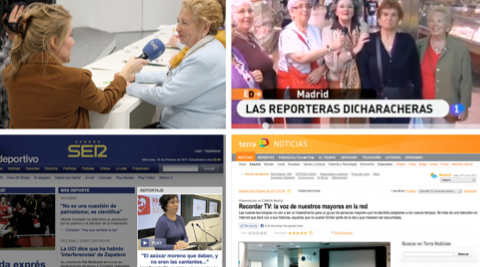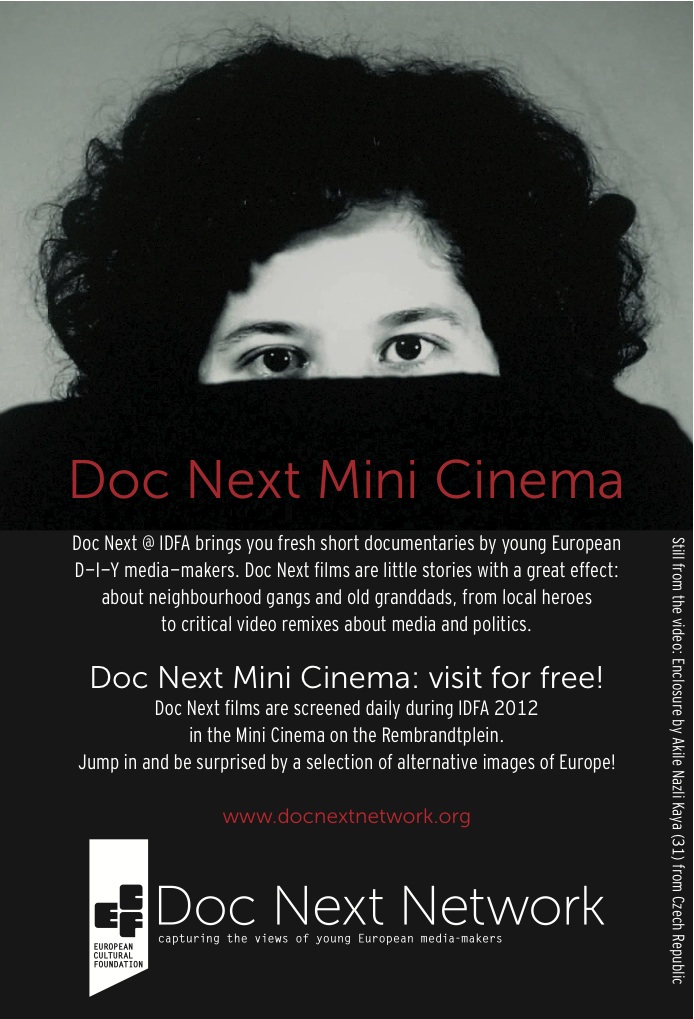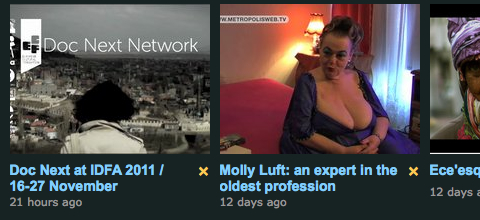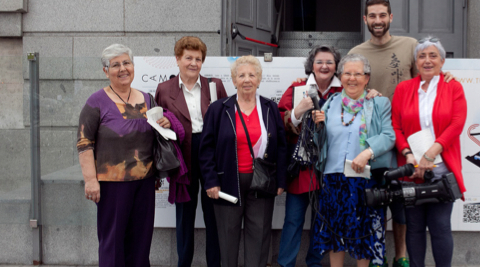Películas de la Doc Next Network dentro de la programación de IDFA.
by ZEMOS98
Entre el 14 y el 25 de Noviembre se celebra el Festival Internacional de Documentales de Ámsterdam (IDFA). Una de las secciones programadas en el Festival de este año es Doc Next, en cuyo marco van proyectarse cortometrajes realizados y producidos por jóvenes europeos que han seguido la metodología DIY (Hazlo tú mismo) y pertenecen a la mediateca de la Doc Next Network (DNN), un proyecto que surge gracias a la colaboración entre la European Cultural Foundation y distintos nodos situados en Turquía, Polonia, Reino Unido, Holanda y España.
La proyección de algunas de estas películas se hará antes de los pases de los documentales largos del Festival. Paralelamente a ellas, en la Plaza de Rembrant, se ha programado el Doc Next Mini Cinema, donde se proyectarán 30 películas de la Doc Next Network y cuya entrada es gratuita.
De entre todas las obras seleccionadas para su proyección, ZEMOS98 ha aportado una selección de vídeos sobre remezcla política que pudieron verse en el 14 Festival. En un contexto como el actual, sobrepoblado de imágenes, el reciclado de las mismas resulta imprescindible para ver en qué punto de nuestra historia estamos, dando una visión del presente a partir de trazos del pasado. Esta selección está compuesta por las obras de producción española Cuentos ilustrados, Abra la boca, Our Dangerous Demands (Occupy Remix), A mi tío y The Manufacture of Consent, la checa Now, Listen!, la belga GLUED y la marroquí Subasta II.
Además, ZEMOS98 aportará otros contenidos como Llegando a todo de Raquel Campuzano, que relata la vida de Carmen, comprometida con el activismo político y feminista desde el trabajo incansable (aún cuando está tan poco reconocido) de activar conciencias dentro de sus grupos de trabajo. Jorge de Lucas Tello donde se muestran algunas conversaciones con Jorge, un inmigrante ilegal que vive en Jerez de la Frontera, e intenta acercar las culturas a través de los relatos comunes. Además podrá verse Es más fácil querer a las cosas pequeñas, reflexión sobre la imagen, donde una voz susurra acompañada de un fondo negro que sólo se rompe con un plano de 3 segundos de duración.
La importancia del DIY
El acceso a herramientas de grabación y edición de bajo coste e Internet, como medio de difusión que permite llegar a mucha gente, se han convertido en los aliados de una nueva ola de realizadores que se desvinculan del sistema, utilizando sus propios medios para contar las historias que les interesan y que de otra forma pasarían desapercibidas. El gran reto ahora es que las películas realizadas con estas directrices adquieran visibilidad para el gran público. IDFA se convierte así en una gran pantalla para que estos jóvenes muestren sus trabajos en un Festival Internacional de reconocido prestigio.
More
Selection of works for a «Political Remix Video» programme
by ZEMOS98
As a result of the Political Remix Video call that both EMBED and Doc Next Network started last December, the following selection of remixing works will be screened during the next ZEMOS98 Festival (14th April):
“Glued” by Benoit Detalle (Belgium) – 5’42″
“Rock the Caucuses” by Smearballs (Canada) – 3’22″
“Now, Listen!” by Dominik Dušek (Czech Republic) – 3’
“Subasta II” by Smalouli (Marrocco) – 2’51″
“The Manufacture Of Consent” by Enrico Argento (Portugal) – 2’22″
“WakeUpArtists! (Dedicated to Malish)” by SpriteHat (Italy) – 4’
“Mutantes” by Duplex Corporeition (Spain) – 4’24″
“A mi tío” by Lacasinegra (Spain) – 1’33″
“Our Dangerous Demands” by Malaventura (Spain) – 2’
“Live Free or Die Hard (Project 12, 8/12)” by Diran Lyons (USA) – 1’12″
“Abra la boca (Open Your Mouth)” by Montserrat Santalla Gasco (Spain) – 3’31″
“Rap News X: #Occupy2012 (feat. Noam Chomsky & Anonymous)” by Hugo Farrant and Giordano Nanni (Australia) – 7’48″
Apart from this programme, two works produced by ZEMOS98 in the framework of Doc Next Network remix workshops will be premiered the same day:
“Cuentos ilustrados” by Pablo Domínguez (Spain) – 12’07″
“Esperanza Umbridge y la Marea Verde” by El Ejército de Dumbledore (Spain)- 2’48″
This Political Remix Video international call has received 124 audiovisual works in a month time. The selection committee has been formed by Felipe G. Gil and Pedro Jiménez de ZEMOS98, Joan Carles Martorell (Yerblues.net) y Alberto Tognazzi (Movil Film Fest).
This committee highlights the fact that all these works go beyond the simple technique of «remixing the contraries». They (together with Jonathan McIntosh at PoliticalRemixVideo.com) understand political remix videos as an audiovisual genre which puts into practice the «situationist detournement», using the media to criticize power structures, to deconstruct social myths and defy the mass-media via «re-cutting» and «re-framing». This remix is done from media fragments mixed with pop culture. Could this way of understanding audiovisual remix be a new kind of documentary? How are we going to access the collective memory if it’s already remixed? Aren’t the media using remix techniques as a sort of aesthetic of social reality? Let’s carry on researching into this path and learn from our community.
MorePressPausePlay
by rubendiaz
MoreThe digital revolution of the last decade has unleashed creativity and talent in an unprecedented way, with unlimited opportunities.
But does democratized culture mean better art or is true talent instead drowned out? This is the question addressed by PressPausePlay, a documentary film containing interviews with some of the world’s most influential creators of the digital era.
A new workshop: HTML5 and open video possibilities
by ZEMOS98
Tienes toda la información en español sobre el taller de HTML5 en la web del CICUS
0. What
“Posibilidades del Open Video y el HTML5” (HTML5 and Open Video possibilities) is a research, educational and work-in-progress project that will be developed using Open Video and the new HTML5 standard.
The main goal of this project is to develop an interactive audiovisual tool for the internet. Contents and developments resulting from the project will be open and free (in the sense of free software).
1. How
This project will make possible to mix and remix video, audio, photos and links using the internet. This project will be a part of the Audiovisual Source Code methodology, so it will develop audiovisual mixtapes from online audiovisual sources. Everything will be online.
2. When
The project has three phases
PHASE 1: Workshop on HTML5 and Open Video, by A Navalla Suiza
12th-14th December 2011 @Sevilla
Contents
- Introduction to HTML5
- Open Video possibilities
- Audiovisual Examples
- Popcorn.js or similar development frameworks
The objective is to develop a simple collaborative audiovisual project in HTML5.
Programme:
1. Introduction to HTML5: HTML, CSS, Javascript.
2. Online video and audio: why it is important that video and audio were HTML elements, video/audio formats, browsers, interaction with HTML elements.
A. Practice: show a video in a HTML document, check the code and features.
3. Use of javascript to develop video/audio events
B. Practice: Using the native javascript API
4. Frameworks and tools to develop video/audio on the net
5. Use of popcorn.js, $media and audio APIs
C: Practice: Design a collaborative project
PHASE 2: Intensive development of the tool
15th-17th December 2011 @Sevilla
PHASE 3: Presentation of the tool with info/documentation of the development process.
April 2012 @Festival UBICUA 2012 (Sevilla)
Who
A navalla suíza is an Internet communication company focused on web development services, social networks and video-based websites. We also develop digital culture & society contents, in particular those related with digital storytelling and crowdsourcing.
With
An initiative by ZEMOS98 for the Doc Next Network, supported by the ECF Youth&Media Programme and CICUS LAb “Sueño Digital” (University of Sevilla)
More
International call for Political Remix Videos
by ZEMOS98
Tienes toda la información en español sobre esta convocatoria de vídeos de remezcla política en EMBED.at
The call for Political Remix Videos (PVRs) is open until December 25th 2011. EMBED, together with the European Cultural Foundation and the Doc Next Network, call for international PVRs. Works participating will become part of EMBED events. Some of them will be included in the Doc Next Network media collection.
Since last year, EMBED has been collaborating with the Doc Next Network by ZEMOS98 (more info here). EMBED has been researching the narratives and uses of audiovisual remix as a tool of reflecting in a critical way.
Now, this call is looking forward to knowing and cataloguing PVRs.
Rules of participation for international call for PVR
We are searching for audiovisual stories that use images to give people food for thought. We absolutely agree with the definition and editorial guide at politicalremixvideo.com:
Political Remix Video (PRV) is a genre of transformative DIY media production whereby creators critique power structures, deconstruct social myths and challenge dominate media messages through re-cutting and re-framing fragments of mainstream media and the popular culture.
These remix works have their roots in the tradition {détournement} where artists twist and subvert mass media, re-purposing it to present alternative messages and narratives. Although PRVs vary widely in form, topic and message, they share are a few common aspects.
First, PRVs present political messages. The word «political» in this context refers to works that are critical of not only of political institutions and government policy, but also social and cultural issues like gender, race, sexuality and environment.
Second, PRVs are guerrilla works as they use the appropriation of corporate intellectual property without the permission of the copyright holder. In addition, these remixes are often highly critical of the source media, making the work particularly vulnerable to DMCA (Digital Millennium Copyright Act is a United States copyright law) takedown notices.
Third, PRV works utilize and embrace dominant media forms as the structure of their alternative messages. These include short news segments, TV ads, speech excerpts, movie trailers and music videos. Unlike most contemporary «video art», remixers are not critiquing sound bite-driven forms of mainstream media through the construction of a non-narrative. Instead, PRVs attempt to form an argument and convey a message in a familiar structure, using the framework as a vehicle to deliver subversive political messages. This makes PRVs accessible to the general public, not just the art world or academics. This accessibility of both form and message is one of the core aspects to the works in this remix genre.
Intellectual property laws are being debated. We defend fair uses and freedom of expression thanks to the rights of quote and parody. This call comes to carry on thinking about these issues which we have already debated within this platform.
In any case, every media-maker participating this call will be responsible for the audiovisual sources and footage he o she is using. So please, keep it in mind when you license your work: quote all sources you used.
Participants
All participants (no matter which nationality or how old the media-maker is) can subscribe a maximum of three works (one entry form per each). No matter date of production of the work.
Formats, duration and language
Works entries are ONLY online. You are allowed to use either a platform that lets you license your work or upload it to your own server or share it within a P2P network.
Every digital video format will be taken.
Duration: less than 10 min. (including the final credits).
Language: English or Spanish.
Selection
Members of EMBED, the Doc Next Network and some other person invited will be part from the Selection Committee.
The selection will work as a playlist for 2012 events related to EMBED. Every time the selection is screened in the future, every media-maker will be paid with 150 EUR (taxes included) as remuneration for public communication.
Apart from this playlist, works that are: less than 5 min. long, in English or subtitled into English and made by European youngsters (born from 1980 on) could be included within the Doc Next Network media collection.
Selection of works, as well as dates and venues for the screenings, will be published at EMBED.
Registration
Media-makers must register through an online form.
Submissions must be accompanied by at least two images (in JPG or PNG format, and at least 720 x 576 pixels).
Participation in this call implies acceptance of these guidelines.
Contact
For any questions or suggestions, please contact ZEMOS98 team at info@ZEMOS98.org.
More
Taller de iniciación al documental DIY
by rubendiaz
Qué:
Taller de iniciación al documental DIY
Dirigido a todas y todos los que tengan inquietud por el nuevo documental y quieran desarrollar una idea desde un punto de vista personal para ponerla en imágenes. Este taller pretende ser un espacio de aprendizaje, pero también de discusión y experimentación sobre cómo expresar en imágenes cuestiones de género.
Quién*:
Imparte el taller Virginia García del Pino (Barcelona, 1966), directora de cine de no ficción y directora de proyectos del Master de Documental Creativo de la UAB. Licenciada Bellas Artes, su producción como videoartista le acerca al género documental. Sus vídeos surgen de una tentativa de comprender el mundo desde una óptica menos dolorosa, gravitando alrededor de las convenciones sociales de la representación, y es, seguramente, en ese intento de comprensión donde suele optar por una contundente sencillez formal. Muestras de ello son Lo que tú dices que soy, Espacio Simétrico, Mi hermana y yo o Mari Carmen.
*Es una producción de ZEMOS98 con el apoyo de la red Doc Next, del programa Youth&Media de la European Cultural Foundation. Este taller cuenta con la colaboración del I+CAS del Ayuntamiento de Sevilla.
Cuándo:
del 29 de noviembre al 1 de diciembre, en horario de mañana.
Dónde:
I+CAS (c/ Torneo, 18 – Monasterio de San Clemente)
Cómo:
Las personas interesadas en participar en el taller, pueden solicitarlo rellenando este breve formulario de inscripción. El plazo terminará el 25 de noviembre a las 15h.
Por qué: Uno de los objetivos principales de la red Doc Next es recopilar documentos de jóvenes realizadores europeos. Lo importante de esta búsqueda son las historias que retratan realidades, por lo general, invisibles en los medios de comunicación dominantes. Por ello, el formato, la calidad o la técnica no son tan relevates como el relato, la biografía, la memoria.
Entre las actividades que ofrece nuestra red, encontramos la media collection, presentaciones y proyecciones, debates e investigaciones y talleres sobre el uso de los medios desde una perspectiva DIY.
Este taller de iniciación al documental DIY busca facilitar la expresión en imágenes en movimiento de esos relatos, biografías y memorias individuales y colectivas. La actitud DIY (Do It Yourself: Hazlo Tú Mismo), con esa contundente sencillez formal que expone Virginia, nos permite contar nuestra propia historia con sensibilidad y construir así nuestra propia visibilidad.
MoreProyección de cortos de la red Doc Next en el SEFF11
by rubendiaz
Esta tarde a las 19h 17.30h en el I+CAS proyectamos una selección de vídeos pertenecientes a la media collection de la red Doc Next.
Los vídeos que se proyectarán son los siguientes:
A Way by Sergey Kirasyan (Armenia)
Biżuteria Publiczna by Iwo Kondefer (Poland)
Bracia by Emi Mazurkiewicz (Poland)
Ece’esque by Bahar Demirkan, Okyar Igli, Hayati Kose and Morteza Moghaddam (Turkey)
Grown up at age of 11in Macedonia by Vladimir Tevcev (Macedonia)
Guilty until Proven Innocent by Danyal Laskar (UK)
Launderette by Bertie Telezynski and Alex Nevill (UK)
Lost in Translation by Akile Nazli Kaya (Turkey)
Sex Sense by José Manuel Borrego, José Manuel Expósito, Pedro Fernández, Rosario Fernández, Noelia Fernández, Belén Márquez, José Antonio Márquez, Iván Ruiz Vergara and Pablo Domínguez (Spain)
The last communist in Berlin by Robin Meurer (Germany)
TRON by Felipe G. Gil (Spain)
Zero Point by Gjorgje Jovanovic (Macedonia)
¿Nos vemos allí?
More“Zombie Girl: The Movie”
by rubendiaz
More“Zombie Girl: The Movie” is a feature-length documentary covering the time it took 12-year-old Austin, Texas, filmmaker Emily Hagins to make her zombie movie “Pathogen”. The film also explores the advancements in technology that have made it possible for so many young people to shoot and edit their own movies.
“El sexo sentido” has been awarded PREMIO VISIBILIDART
by rubendiaz
“El sexo sentido” (Sex Sense) is a short documentary about youth, sex, love and fears. This video belongs to Doc Next Network media collection and has been made during the audiovisual workshop ZEMOS98 produced at El Viso del Alcor (Seville, Spain), in the IES Profesor Juan Bautista (June 2011).
We’d like to congratulate the media makers José Manuel Borrego, José Manuel Expósito, Pedro Fernández, Rosario Fernández, Noelia Fernández, Belén Márquez, José Antonio Márquez, Iván Ruiz Vergara, together with the coordination of Pablo Domínguez and Rubén Díaz (both members of ZEMOS98) because of the VISIBILIDART 2011 prize, given by COLEGADES (a LGBT association located in Cádiz, Spain).
The VISIBILIDART prize awards those cultural initiatives that make efforts to eradicate homophobia and to promote democratic values.
“El sexo sentido” has aroused great interest as it was broadcasted in the Spanish National TV (TVE) programme “Cámara Abierta 2.0”:
MoreRecordar.TV, listening to our elders
by rubendiaz
Recordar TV (Remember TV) is an internet television built up from the perspective of the elderly. It aims to encourage digital literacy among this collective, promote their stories, which do not often take part on the net, and also help with the local issues that could be of public interest on the internet. This is an internet television project, therefore we will not only publish videos, we will take advantage as well of the multimedia languages that are possible on the web.
You can find an English version of the project’s dossier here
The elderly of our society have many things to tell us and Recordar TV has a vocation for listening to them. We would like to encourage those stories which are not usually present on the web and look after local worries subject to public interest and also being creative at the same time. And we would like to do it through an internet television. But not just any television on the internet, but one which is made from the perspective of the elderly. For and by them. And, in that way, help out with the digital literacy of this wide social group, which is highly relevant nowadays in the current paradigm in which life expectancy keeps increasing.

The lack of communication of a society with their elders usually is not an issue of age difference, neither it is due to diverse generations not understanding one another. Sometimes it happens that the tools we use to do it are just different. Because growing older not necessarily means stop being young. That is the reason why we want to share the tools that exist nowadays with people that did not have, for whatever reason, the chance to get to know or handle them with ease to make them part of their everyday life.
We are going to explore the lands where languages get mixed up, where prejudices vanish away, where lives cross one another. We are going to play again.
Because it is never too late to learn. And it does not matter how much you know, but how willing you are to keep learning.
More







